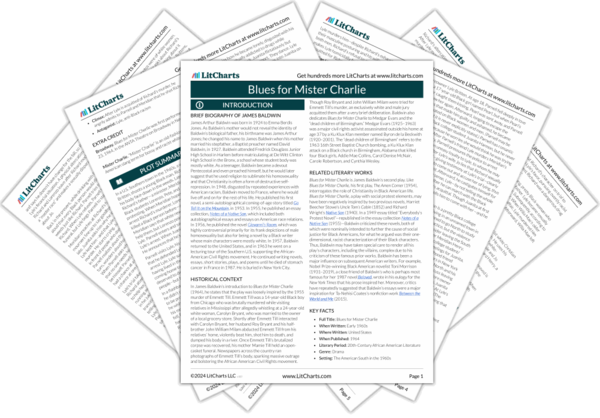Blues for Mister Charlie represents people with racist attitudes as unable to see other human beings’ individuality: instead, it shows how racism causes people to perceive others through stereotyped, racialized fantasies of their own. Thus, people with racist attitudes are on a fundamental level alienated both from other people and from the truth. This representation of racism and individuality is clearest in the play’s depiction of Lyle Britten, a poor white store owner living in an unnamed U.S. Southern town in the 1960s. Lyle sees everyone—white and Black—through racist fantasies of white supremacy and Black dangerousness. Anxious and insecure about his own masculinity, he rapes Willa Mae, the young wife of an older Black man, subsequently conducts a dubiously consensual affair with her, and brags that she told him he was better in bed than any Black man. When the woman’s husband confronts him, Lyle murders the husband and claims it was self-defense because the man was “crazy” and dangerous. Lyle sees Black women as sexual targets, and Black men not as people who might care about their wives’ well-being, but as potentially violent and dangerous sexual competitors. Lyle eventually murders another young Black man, Richard Henry, because Richard refuses to apologize to him or call him “sir”—that is, because Richard asserts his dignity as a human being rather than bowing to Lyle’s fantasies of white supremacy.
Lyle’s racist attitudes prevent him from seeing the individuality not only of Black people but also of white people, albeit with less murderous results: for example, he marries his wife Jo not because he loves her but because he sees her as an acceptable racial type, a chaste “white virgin” whom he is sure will be faithful to him. He does not know—and displays no curiosity about—her inner life. Moreover, Lyle really only thinks of himself as a “white man”—barely a particular individual himself. In the play, then, racism leaves racist white people like Lyle stranded in a fantasy world and unable to connect with others or themselves on a human level.
Racism and Individuality ThemeTracker

Racism and Individuality Quotes in Blues for Mister Charlie
Ken: How much does your wife charge?
Meridian: Now you got it. You really got it now. That’s them. Keep walking, Arthur. Keep walking!
Tom: You get your ass off these streets from around here, boy, or we going to do us some cutting—we’re going to cut that big, black thing off of you, you hear?
Parnell: You may think that a colored boy who gets ruined in the North and then comes home to try to pull himself together deserves to die—I don’t.
Richard: My mother fell down the steps of that damn white hotel? My mother was pushed—you remember yourself how them white bastards was always sniffing around my mother, always around her—because she was pretty and black!
Richard: Every one of them’s got some piss-assed, faggoty white boy on a string somewhere. They go home and marry him, dig, when they can’t make it with me no more—but when they want some loving, funky, down-home, bring-it-on-here-and-put-it-on-the-table style—
Juanita: They sound very sad. It must be very sad for you, too.
Parnell: He’s a poor white man. The poor whites have been just as victimized in this part of the world as the blacks have ever been!
Parnell: Meridian—what you ask—I don’t know if I can do it for you.
Meridian: I don’t want you to do it for me. I want you to do it for you.
Parnell: Nobody in the world knew about her inside, what she was like, and how she dreamed, but me. And nobody in the world knew about me inside, what I wanted, and how I dreamed, but her.
Juanita: I used to watch you roaring through this town like a St. George thirsty for dragons. And I wanted to let you know you haven’t got to do all that; dragons aren’t hard to find, they’re everywhere. And nobody wants you to be St. George. We just want you to be Parnell.
Lorenzo: They been asking me about photographs they say he was carrying and they been asking me about a gun I never saw. No. It wasn’t like that. He was a beautiful cat, and they killed him.
Lyle: You ain’t no better than me!
Parnell: I am aware of that. God knows I have been made aware of that—for the first time in my life.











